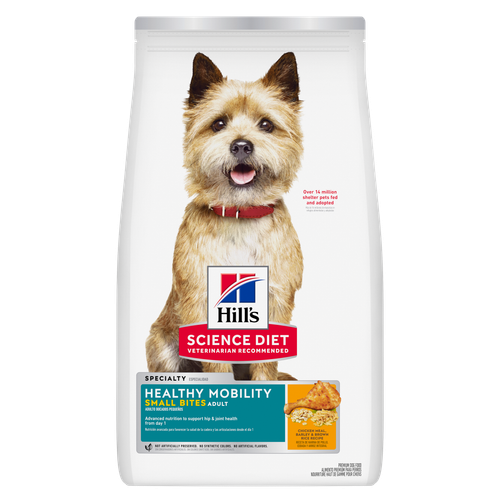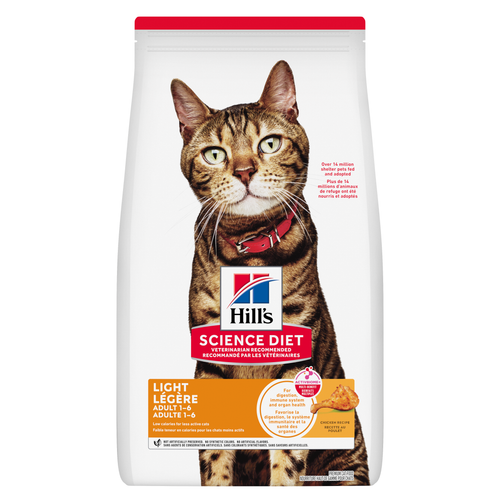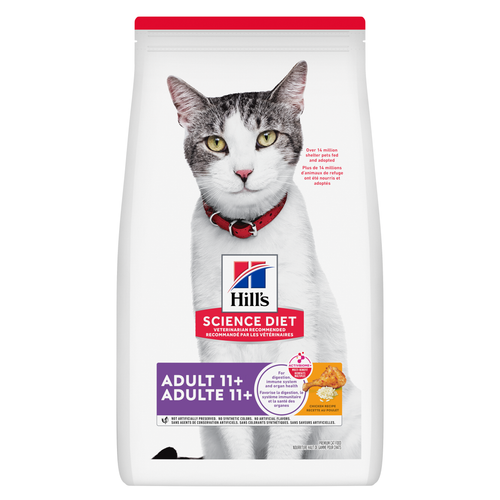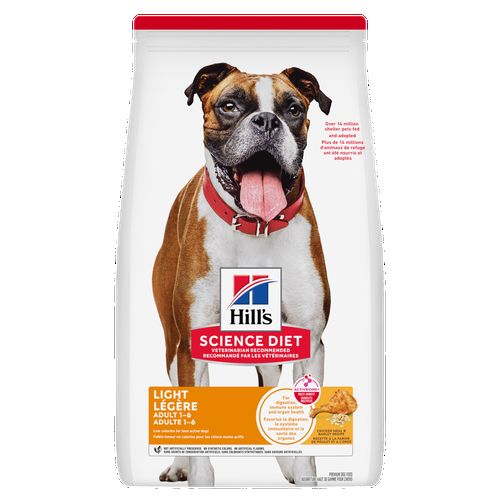
-
Find the right food for your petTake this quiz to see which food may be the best for your furry friend.Find the right food for your petTake this quiz to see which food may be the best for your furry friend.Featured products
 Adult Light Large Breed Chicken Meal & Barley Recipe Dog Food
Adult Light Large Breed Chicken Meal & Barley Recipe Dog Food18% lower calories vs. Science Diet Large Breed Adult
Shop Now Adult Healthy Mobility Small Bites Chicken Meal, Barley & Brown Rice Recipe Dog Food
Adult Healthy Mobility Small Bites Chicken Meal, Barley & Brown Rice Recipe Dog FoodAdvanced nutrition to support hip & joint health from day 1
Shop Now Adult Sensitive Stomach & Skin Small & Mini Chicken Recipe Dog Food
Adult Sensitive Stomach & Skin Small & Mini Chicken Recipe Dog FoodHill's Science Diet Sensitive Stomach & Skin Small & Mini dry dog food is tailored nutrition for Small & Mini dogs while being gentle on stomachs. Nourishes skin & promotes a lustrous coat.
Shop NowFeatured products Adult Light Chicken Recipe Cat Food
Adult Light Chicken Recipe Cat Food20% lower calories vs. Hill's Science Diet Adult
Shop Now Adult Healthy Cuisine Seared Tuna & Carrot Medley Cat Food
Adult Healthy Cuisine Seared Tuna & Carrot Medley Cat FoodDelicious seared tuna paired with tender carrots in a mouthwatering sauce
Shop Now Adult 11+ Chicken Recipe Cat Food
Adult 11+ Chicken Recipe Cat FoodSupports brain health & beautiful fur. Helps keep immune system, heart & kidneys healthy.
Shop Now -
Dog
- Dog Tips & Articles
-
Health Category
- Weight
- Food & Environmental Sensitivities
- Urinary
- Digestive
- Joint
- Kidney
- Dental
- Cancer
-
Life Stage
- Puppy Nutrition
- Adult Nutrition
- Senior Nutrition
Cat- Cat Tips & Articles
-
Health Category
- Weight
- Skin & Food Sensitivities
- Urinary
- Digestive
- Kidney
- Dental
- Stress
- Cancer
-
Life Stage
- Kitten Nutrition
- Adult Nutrition
Featured articles Water
WaterDiscover why water is the most important nutrient for your dog or cat to live a healthy life. Find out how much water your pet should consume each day.
Read More Antioxidants
AntioxidantsUnderstand the importance of antioxidants in your dog or cat's food, and how they can help protect your pet and keep them healthy.
Read More Importance of DHA in your Pet's Food
Importance of DHA in your Pet's FoodLearn about DHA, Docosahexaenoic Acid, a natural omega-3 fatty acid that is essential in the development of the brain and nervous system in cats & dogs.
Read More -


Dogs eat dead things. Dogs eat slimy things. Dogs eat ... well, almost anything! When considering the household items that could be problematic for your pet, you might've overlooked one of the most common ones: soap. Because, we as humans, like to add pleasant smells to our soaps, your dog might think they are a tasty treat. If your dog ate soap, you might be worried. Will they get sick? Is soap poisonous?
If your dog ate a bar of soap or licked some liquid soap, you're justified in being a little concerned — but there's no need to panic. Read on to learn the facts, including what soap is actually made of, how eating soap can affect your dog's health and how to know when you should bring your pup to the veterinarian.
What's in Soap?
While every soap is slightly different, most liquid soaps contain water, oils (usually cocamide DEA, monoethanolamine and/or glycerin), fragrances and dyes, among other ingredients, such as sodium lauryl sulfate, parabens, triclosan and cocamidopropyl betaine.
Bar soap and soaps labeled "natural" have similar ingredients. Some soaps may also contain essential oils or dried herbs.
Your Dog Ate Soap: Should You Be Worried?
Some of the ingredients commonly used in soaps are harmful to humans if ingested. However, it can be difficult to know exactly how dangerous it is for dogs to ingest soap.
Soaps containing essential oils can be especially harmful to a dog's health. Pet Poison Helpline explains that pine oil, a common additive in disinfectants and cleaning products, can cause severe side effects in dogs who ingest it. Consuming soap that has pine oil in it can cause vomiting, skin irritation, drooling, weakness, loss of muscle control and can potentially harm their kidneys and liver.
Soaps may also cause chemical burns in your dog's mouth, esophagus and stomach. Additionally, ingesting a large chunk of soap may cause a blockage in your pet.



Tasty Tips
Signs to Watch For
If you think your dog ate soap, immediately take the soap away from them, flush their mouth out with water and contact your veterinarian. They may suggest monitoring them for the next few hours, or they may recommend bringing them to the clinic right away if they exhibit any abnormal behavior.
According to Wag!, here are the signs to look out for:
- Drooling
- Licking more than normal
- Frequent swallowing
- Pawing at the face
- Vomiting
- Diarrhea
What to Expect at the Vet
If you bring your dog to the vet, they'll conduct a physical exam. Bring the packaging or ingredient list for the soap that your dog ate, if you have it — this will help the vet understand what they're dealing with and can help guide treatment. They may need to perform an endoscopy or take an X-ray to get a full picture of your dog's condition. They may also recommend hospitalizing your dog to monitor them. Depending on how long ago you saw your dog eat the soap may also influence their course of treatment.
If your dog ate a bar of soap, don't panic. Take any remaining soap away from them and get them to the vet if your vet recommends bringing them in. Most importantly, remember to keep all soap products in areas that are out of reach for your curious pet. That way, you can limit the chances of a repeat event and help keep your pooch safe and healthy.


Erin Ollila believes in the power of words and how a message can inform—and even transform—its intended audience. Her writing can be found all over the internet and in print, and includes interviews, ghostwriting, blog posts, and creative nonfiction. Erin is a geek for SEO and all things social media. She graduated from Fairfield University with an M.F.A. in Creative Writing. Reach out to her on Twitter @ReinventingErin or learn more about her at http://erinollila.com.
Related products

Hill's Science Diet Sensitive Stomach & Skin Small & Mini dry dog food is tailored nutrition for Small & Mini dogs while being gentle on stomachs. Nourishes skin & promotes a lustrous coat.

18% lower calories vs. Science Diet Large Breed Adult

18% lower calories vs. Science Diet Adult

Advanced nutrition to support hip & joint health from day 1
Related articles

Learn basic steps & precautions for treating a cut on your dog, including what you can put on the cut, and when you should take them to the vet.

Your dog's coat and skin are a big part of your dog's overall health. Ensure you keep your dog's coat healthy, by following these simple tips.

Discover how the field of dog science is giving us more and more insights into the inner workings of our furry best friends.

Learn how dogs with sensitive skin can have special dietary needs, how they can develop over time in a healthy dog, and how Hill's dog food can help.

Put your dog on a diet without them knowing
Our low calorie formula helps you control your dog's weight. It's packed with high-quality protein for building lean muscles, and made with purposeful ingredients for a flavorful, nutritious meal. Clinically proven antioxidants, Vitamin C+E, help promote a healthy immune system.
Put your dog on a diet without them knowing
Our low calorie formula helps you control your dog's weight. It's packed with high-quality protein for building lean muscles, and made with purposeful ingredients for a flavorful, nutritious meal. Clinically proven antioxidants, Vitamin C+E, help promote a healthy immune system.

